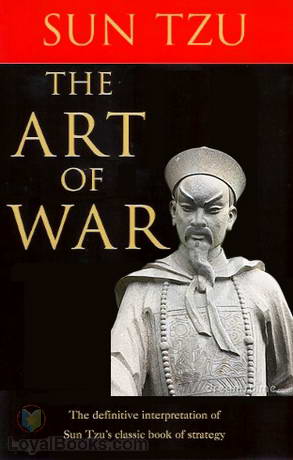“The Art of War” – in Business
Business lessons from a Chinese General
More...
I have a little book called “The Art of War”, which was written in China 2,500 years ago, by the Chinese General SUN TZU.
The book although written with warfare in mind, contains so much strategic and management common sense that I believe that it should be on the desk of every Chief Executive, Business Owner and Marketing Executive.

I have chosen “The Art of War” as a subject, because it seems to me that business activities are a microcosm of warfare. Your competitors are the opposing armies. The territory you are fighting for is the market segment of other businesses or consumers that currently use, or could potentially use your product.
The essence of SUN TZU’s book is explained
If you know the enemy and know yourself, you need not fear the result of a hundred battles.
If you know yourself but know not the enemy, for every victory gained you will also suffer a defeat.
If you know not the enemy or yourself, you will succumb in every battle
Your weapons are:
- Your Product Mix
- Your Price
- Place (Distribution)
- Your Promotion Strategies
Victory goes to the business that can not only gain territory from their competitors, but also hold onto it and more important make it profitable.
After all, there is no point in fighting over something that proves ultimately worthless, or is destroyed in the fight.
A typical “price war” often ends up with all parties losing

Strangling Margins
The perceived price / value ration of the product or service is driven down, with the winner inheriting a market with much lower margins and profits and educating price savvy customers.
It is not easy to increase the price to recover war costs and lost margins later.
The purpose of war is peace!
It sounds contradictory, but SUN TZU reminds us that the purpose of war / competition is the long term one of ensuring peace and prosperity, not war as an end in itself.
The supreme art of war is to subdue the enemy without fighting
SUN TZU emphasised the importance of strategies which gained the objectives without fighting. Rather than overt competition in business with others for the same customers, using intelligence and natural advantages to take market share is the real marketing artform.
This doesn’t apply to my business ?
It may be that you have read so far and said to yourself that warfare does not apply to your business or industry. There are no competitors. We all work together and we are happy with our market share and profits!
Beware
You are more vulnerable than you think.
Firstly your competitors are not just those who sell the same product or service, but anything else your customers could be buying instead of your product.
Secondly you have the equivalent of a “land of plenty” to attract new market entrants, with new ideas and an aggressive approach.
When I was at school in the United Kingdom (UK) many years ago, there was only one brand of potatoe chip - "Smith's Crisps". They came with a little packet of salt and no flavours.
Smith’s had 100% of the market and no competitors, until Golden Wonder came along and ambushed them with multiple flavours like Smokey Bacon and Cheese & Onion and modern packaging.

It was a real ambush too. Golden Wonder sales teams went round the market just ahead of the Smith’s salespeople’s standard order-taking runs, with a “stock-in” price offer that was irresistible. When the Smith’s representative arrived the retailers already had a full stock of Golden Wonder in plain and multiple flavours. So, no orders for the Smith’s salesman.
Smith’s lost their market overnight! Then Golden Wonder started a TV advertising campaign to make sure they held on to the new market.
All orchestrated and brilliantly managed.
Know the Enemy
This is the first of SUN TZU’s rules for successful warfare.
So, ask yourself, how well do you know your enemies. This applies whether you are working in a business to business environment, in the service industry, in retail or handling consumer products or services.
How well do you know your Competitors?
- Do you know your competitors and could you identify your potential competitors?
- Do you know what your competitor’s market share is and their sales per month in units and dollar terms?
- How much do they spend on advertising and promotion per month / per year?
- Do you know and monitor, the recommended and advertised prices for the products and services they have which compete against yours?
- Do you know the margins they operate on for competing products and services?
- What problems if any do your competitors have with sales / production? Or, their business generally?
- How effective is their Management Team?
- Do you know what base salaries and commissions the sales staff work on and their expected sales performance figures in terms of budgets and targets?
- Do you know what add-on sales performances are expected from their sales staff and how they are rewarded for these sales?
- Have you written down the strengths and weaknesses of all your competitors.
If you are collecting this information on a constant basis, congratulations.
If you are not you should start seriously think about how you can get it.
SUN TZU used spies, observation and calculation to get his information and you can too. But you also have industry bodies, government departments and the Department of Statistics to help you as well.

It’s worth remembering that a quiet lunch or drinks after work or an invitation to a social function, with a customer, a competitor’s manager or even a supplier to your industry can provide very useful background of a factual and psychological nature.
Now consider, as the General in your business, what you should do with this valuable information?
Also consider how to avoid passing accurate information or how to pass misinformation to your competitors.
Know Yourself
The second part of SUN TZU’s rule is to know yourself. The strengths and weaknesses of your own business and industry.
Viewing your own organisation objectively and rationally is not an easy task. I would recommend bringing someone in from outside your business as a worthwhile investment, to gain an ego free picture of where you are now.
If you are going to do battle with a formidable opposition, it makes sense to be realistic about your capacity to win, or at least stop them from winning.
Questions you could ask about your own business.
- How does my organisation compare with the competition in size of resources? What market share do we have or which key market segments do we miss out on or dominate?
- How do my results compare with what I know of my competitor’s sales figures?
- How much does my business spend on advertising and promotion per year / per month compared to my competitors?
- How does my businesses product mix, prices, distribution and promotional mix compare with my competitors?
- Does my organisation succeed in retaining customers over the long term? How does this compare with my competitors?
- How do my sales staff compare with the competition in terms of sales per person (units & dollars) and add-on sales as a percentage of sales made?
- Are my sales staff as well trained, resourced and empowered as my competitors?
- How motivated and enthusiastic are they?
- Do I demand, expect and reward high performance from each member of the sales and production teams?
- Have I, as the General, developed a strategy or range of strategies for out manoeuvring my competitors?
There are clearly many more questions you could pose, to gain a realistic comparison of your business with your competitors.
Strategy
Once you have accurate and up to date information on your competitors and a realistic assessment of your own strengths and weaknesses. You can work on strategy. SUN TZU says that the General’s job is to devise strategies that confound the purposes of the enemy, as far as possible without fighting.
For example if your business is small versus your opposition, then guerrilla tactics where you hit at vulnerable targets and run, would be the way to go instead of a head to head price / product war that you would probably lose.
You might consider a “Cherry Picking” strategy, aiming your efforts at the opposition’s best and most profitable customers.
Strategic Thinking
Patience & Action
An organisation I was working for recognised that the opposition’s main strength was their Sales Manager. So they recruited him for themselves, along with the best customers. You might consider stealing your competitor’s top salesman.
There are thousands of different ways to fight and win if you think hard about it and combine strategic thinking with patience and action.
However as usual there is a word of warning from SUN TZU, to first make sure your own business is strong and that all your defences will hold up to a counter attack.
Conclusion
Although he wrote “The Art of War” in 500 BC, SUN TSU’s book gives good pointers for anyone in a strategic management position in business, particularly the owner.
Accurate information interpreted well and a realistic assessment of your own strengths and weaknesses is the first key to both good marketing management and to the Art of War.
Know yourself and know your enemy.
The strategies you put into place as a result of that information should help your organisation to gain territory / market share without fighting or aggression. Preferably without your competitors even knowing that they have lost a battle.
Ensure you can defend your own territory.
Do a lot of thinking and planning before you start an aggressive campaign.
War is an expensive strategy.
SUN TZU says
He who wishes to fight must first count the cost
However, war is sometimes the only option in response to an aggressive competitor, when the alternative is capitulation and a reduced share of a smaller market.
The question then is do you give in and try to live with the invaders, while accepting the steady erosion of the best bits of your market, or draw a line in the sand?
If “Drawing a line in the sand is your option” I commend “The Art of War” to you.


